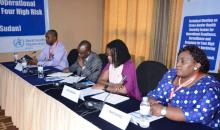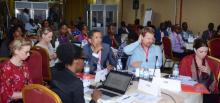Cross-border health security issues for Operational Readiness, Surveillance and Response
WHO Regional Office for Africa, in collaboration with the Ministry of Health of Rwanda, organised in Kigali, from 22nd to 23rd May 2019, a technical meeting on cross-border health security issues for Operational Readiness, Surveillance and Response. The meeting gathered five countries including DRC and four other countries (Burundi, Rwanda, South Soudan and Uganda) bordering DRC to improve the readiness capacities of their national health systems to minimize the health effects of public health events and to review their current status and agree on strategies for strengthening operational readiness for major health security risks and cross border surveillance and response to public threats.
The meeting was opened by Dr Jose Nyamusore, Division Manager of Epidemic Surveillance and Response in Rwanda Biomedical Center on behalf of the Ministry of Health, and Dr Juliet Bataringaya, Technical Officer for Health Systems Strengthening, WHO/Rwanda.
In his speech, Dr Jose, welcomed participants and wished them a good and useful stay in Rwanda, the country of thousand hills and called on participants to "understand well the risk of perception and build country ownership, integrity and good governance to manage health security issues and reach the community resilience".
Dr Juliet, on behalf of WHO, highlighted that the meeting "will provide an avenue to develop a Sub-regional Strategic road map to leverage the role of local health authorities in putting in place the minimum components of operational readiness (All Hazards plan, contingency planning, Business continuity plans, Incident management systems, early warning systems among others)" and also "a joint road map implemented in a coordinated, collaborative and harmonized manner to ensure that any health threat will be detected and controlled at source".
The specific objectives are to refresh the knowledge of the public health authorities (MOH/WHO) on the regional and national context and complex aspects of health security through sound risk analysis and health security preparedness processes; agree on key interventions or processes that each member state should undertake or have in place to ensure operational readiness (of a MS) for public health threats; provide a platform for consultations with Member States to identify and jointly agree on priority areas for collaboration and interventions and eventually to agree on developing a sub-regional framework for collaboration for health security; discuss establishment of mechanism to mobilize international expertise amongst member states to support and coordinate activities related to health security; review the current status of inter-country (cross-border) disease surveillance zones and a response committees in each zone to coordinate and implement disease control and management interventions along the border area, and agree on road map with clear time lines for implementation of agreed benchmarks towards having a recommended level of operational readiness capacity at the country level and strengthened cross-border surveillance mechanism.
WHO seeks to support these countries to come up with cross-border surveillance mechanisms and actions to enable collaboration and information sharing for prevention, early detection, and response to public health hazards with cross-border transmission potential and build country capacities for resilience in regards with all hazards. About forty participants attended the meeting.






